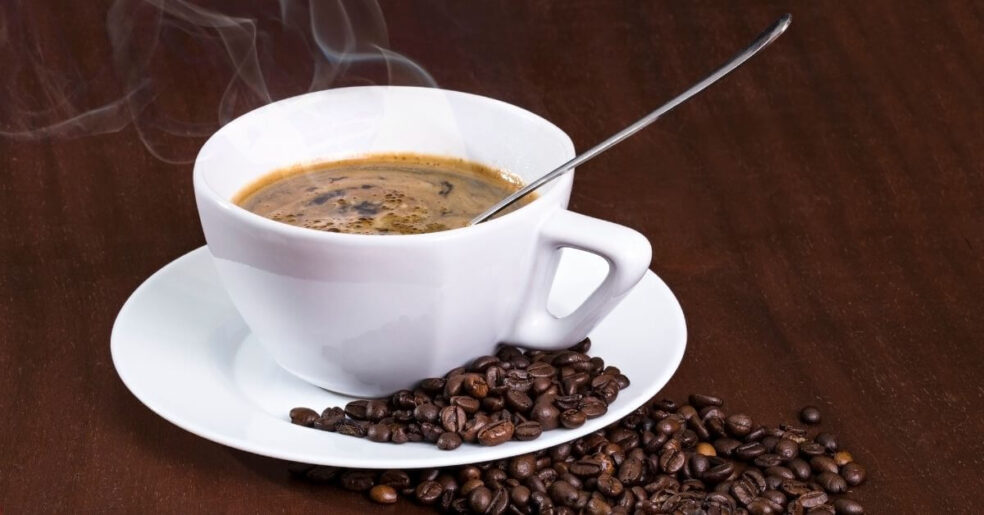Brewing great coffee is part art and part science. But sometimes it doesn’t go as planned and you end up with a cup of coffee that tastes metallic.
Why does this happen and what can you do about it?
Keep reading to see the top 7 causes and solutions!
1) Hard Water Can Make Your Coffee Taste Metallic
Great-tasting coffee starts with great-tasting water. But if you brew your coffee with hard water (i.e. water with high levels of calcium and magnesium) your coffee could end up tasting metallic.
Whether or not your water is hard depends on where you live, but there are a few signs you can look for to know for sure:
- White spots on your glasses and utensils could be a sign of hard water
- There’s mineral buildup on your faucets
- Your faucets have low water pressure
- Your skin feels unusually dry after washing
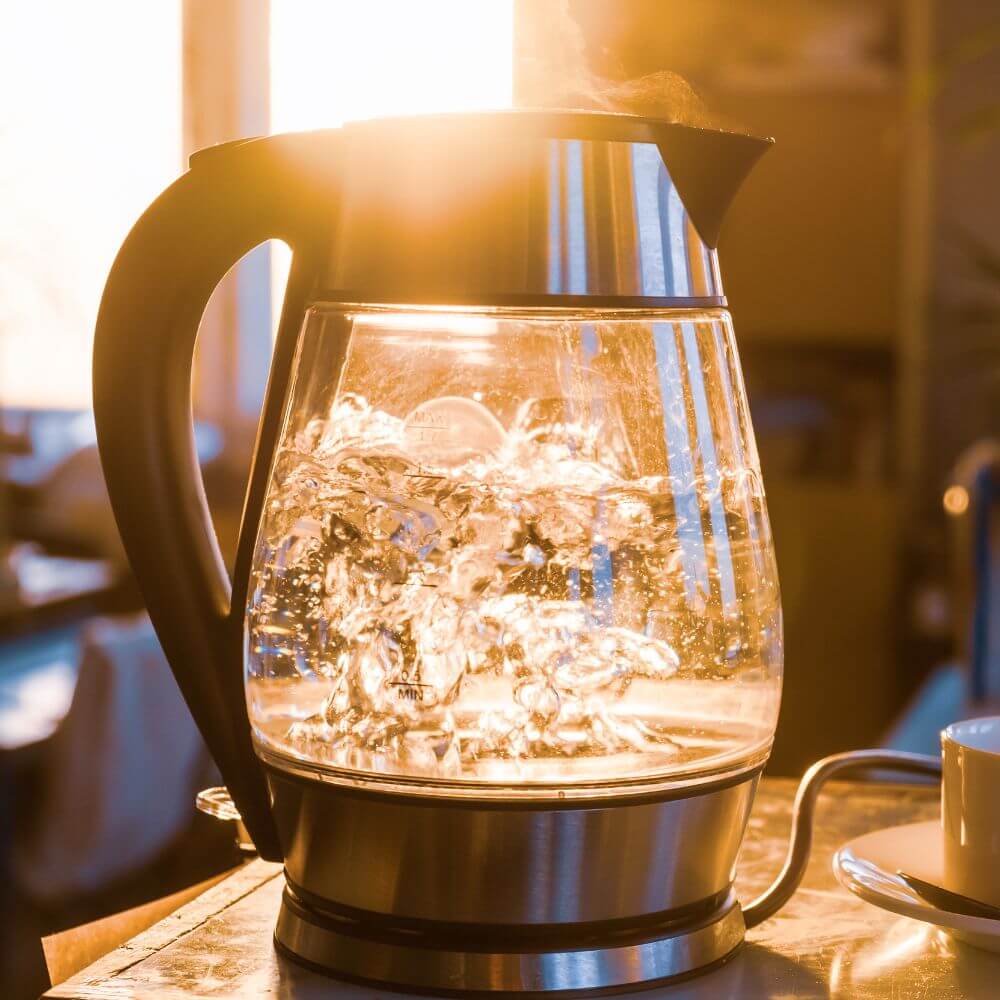
But don’t worry. If your water is hard, you’ve got a few quick and easy options.
- Use bottled water
- Use a water filter
- Boil your water. (Boiling it for a few minutes will cause the mineral deposits to sink to the bottom.)
If these options don’t get rid of the metallic taste, you may have another issue.
Related Posts:
- Best Cold Brew Coffee For Intermittent Fasting!
- Best Bedroom Coffee Maker (Top 6 Picks!)
- Best Lavazza Coffee: Top Coffee To Try!
- Moka Pot Size Guide (What Size Moka Pot Do I Need?)
2) Some Coffee Makers Can Leach Metal Into Your Coffee
It’s possible that your coffee maker is the culprit behind your metallic-tasting coffee.
Many coffee makers, like Moka Pots and percolators, are made out of aluminum. While these aluminum appliances often leach metal into your coffee, there are a few things you may be doing to make it worse:
- Scrubbing your coffee maker with abrasive materials and scratching the aluminum.
- Cleaning your coffee maker with baking soda to remove spots and stains could cause additional leaching
- Putting your coffee maker in the dishwasher can cause additional leaching as well
If you’ve recently done any of these to your coffee pot, that may be why your coffee tastes metallic. Instead of washing it with harsh materials, consider just rinsing it out and wiping it down gently.
(To learn more about why metal leaches into coffee, check out our post “Aluminum vs Stainless Steel Moka Pot“.)
3) Your Coffee Maker Needs To Be Cleaned Or Descaled
Even if you use filtered or bottled water, your coffee maker will need to be cleaned or descaled after a while. If you don’t do either of these regularly, there’s a chance your coffee could develop a metallic taste.
After every brew, coffee oils, and residue remain in the coffee maker. While many people would recommend leaving it there, those oils and residues will go bad or rancid over time. After a while, the flavor and quality of your brewed coffee will definitely change.
But even if you clean your coffee pot regularly, you’ll occasionally need to descale it as well. Even filtered and bottled water can’t protect your coffee maker from mineral buildup over time. And this buildup can interact with your coffee and give it a metallic taste.
The best way to descale a coffee pot is to brew equal parts water and vinegar in the coffee machine. (without using coffee grounds of course!) Then, run regular water through the machine to clean out any residual vinegar.
Related Posts
- What Milk Froths Best? Perfect Picks For Your Coffee!
- Is Instant Coffee Real Coffee? Here’s The Truth!
- Where Do Coffee Beans Come From? Get To Know Your Coffee Cup!
- Strictly High-Grown Coffee: Smoothest Coffee Ever?
4) Under Or Overextracted Coffee May Taste Metallic
Brewed coffee can also taste metallic when it’s under or over-extracted.
Under-extraction simply means that not enough of the coffee’s compounds were dissolved. By comparison, over-extraction is when too many compounds were dissolved.
Extraction level affects flavor because different flavors are pulled out of the coffee bean at different points of the brewing process.
- Acids, which taste sour, are extracted first.
- Oils, which give the coffee aroma and body, are extracted next.
- Sugars, which add sweetness, are extracted third.
- Finally, plant fibers are extracted which add bitterness.
By extracting too little (only the acids are dissolved) or too much (plant fibers are dissolved) you could end up with coffee that some might describe as metallic-tasting.
The solution? Stick to 2 tablespoons of ground coffee for every 6 ounces of water.
(To read more about the ideal coffee brewing ratio, check out our post “How Many Tbsp Of Coffee Per Cup?“)
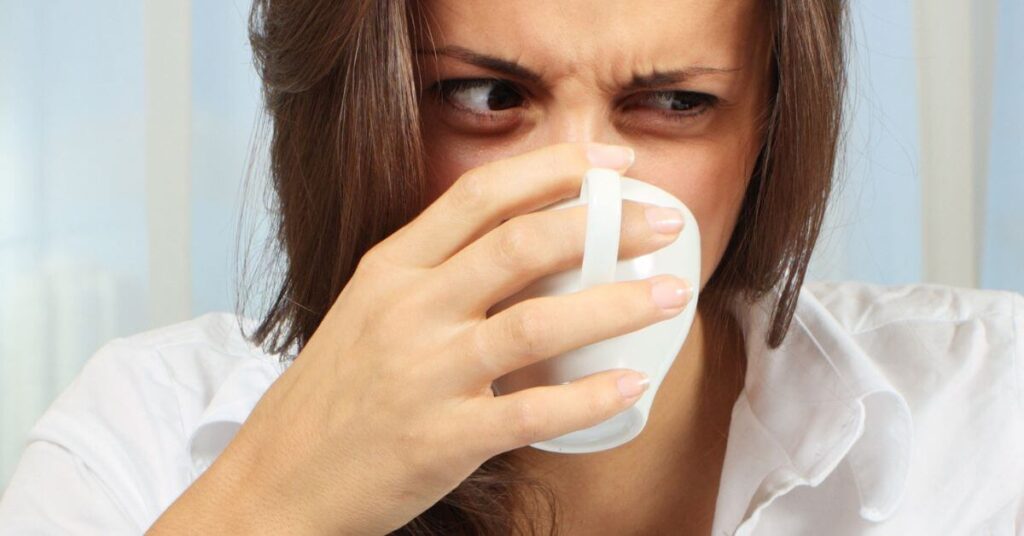
5) Poorly Roasted Or Low-Quality Coffee Beans Can Taste Metallic
If you’ve ever had to return a defective product to the store, you know that manufacturers sometimes make mistakes. Well, the same is true for coffee sellers.
No matter how amazing the packaging looks, there’s a possibility that there’s a bad batch of coffee beans inside.
By bad batch, we mean that either
- Low-quality beans were mixed with high-quality beans.
- good beans were roasted poorly
Low-Quality Coffee Beans
Many countries have coffee grading systems that separate high-quality from low-quality beans. But if a mistake was made during the sorting process, your coffee might not taste as you expected.
Poorly Roasted Coffee Beans
Perhaps the quality of your beans is fine, but the roaster made a mistake while roasting or packaging the beans. While unlikely, it’s definitely possible.
In either case, it could result in metallic-tasting coffee.
6) A Dirty Or Overheated Coffee Grinder Could Affect Flavor
If you don’t clean your grinder regularly, unwanted flavors could be added to your coffee. This happens because coffee grinds that remain in your device will continue to oxidize and break down over time.
So, when you go to grind another batch of coffee, those old, rancid flavors will get mixed in with the new coffee which may result in a metallic taste.
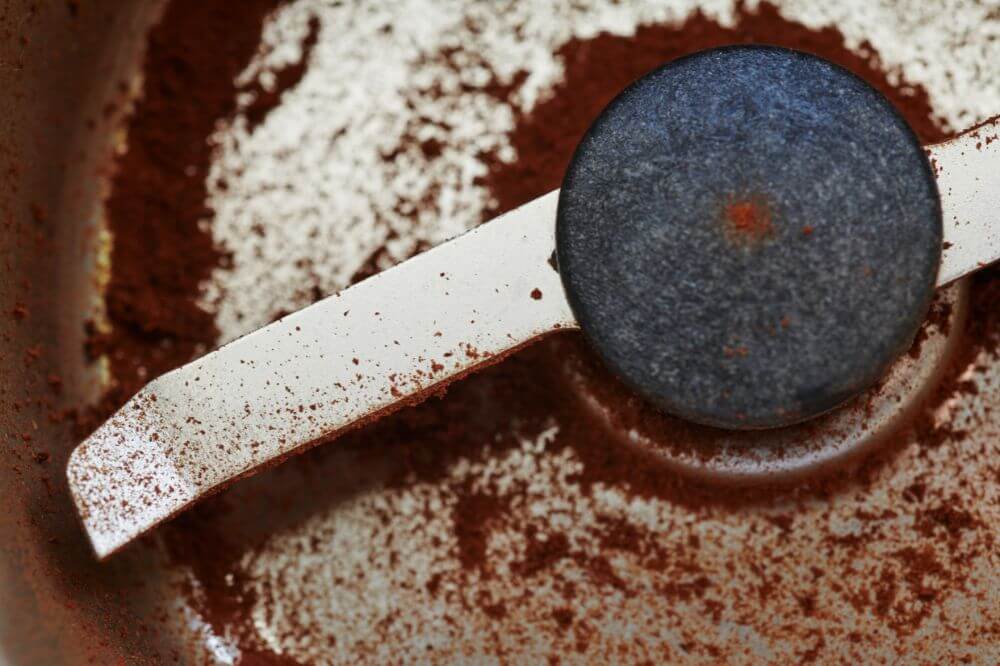
Another possibility is that you’re using your grinder too much. If you grind a large amount of coffee your grinder’s motor could quickly overheat. This may result in overheated electrical fuses which could add a burnt or metal-like quality to your coffee.
One final option is that your grinder is brand new. Often, appliances from the factory have a chemical smell to them. If you recently bought a new grinder and haven’t cleaned it yet, that might be why your coffee has a metallic taste.
(To read more about cleaning new grinders check out our post “Should I Clean My Coffee Grinder Before First Use?“)
7) Your Coffee May Taste Metallic For Medical Reasons
While coffee can taste metallic because of the water, beans, or appliances, there is one final possibility. Your coffee could taste metallic because of something going on in your own body.
And according to WebMD, there are several reasons you could have a metallic taste in your mouth.
Here are a few common reasons this could happen.
- Some medicinal side effects change your ability to taste
- Some diseases, allergies, or infections may affect your taste
- Poor oral hygiene may affect how coffee tastes
- Pregnant women often report having a metallic taste in their mouth
- Acid reflux, heartburn, and indigestion could also cause a metallic taste
If any of these applies to you, that could be why your coffee has a metallic taste.
Key Takeaways – Why Does My Coffee Taste Metallic:
There are 4 main reasons why your coffee may taste metallic.
It’s either,
- the water you’re using contains too many minerals
- the coffee beans are low-quality
- the taste could be coming from your coffee appliances
- something going on in your body could be affecting the taste
Cheers Coffee Lovers!

KEEP READING
- Are Moka Pots Dishwasher Safe? Here’s What To Expect!
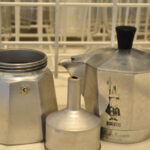
- Does Espresso Break A Fast? Must Know Facts!

- Why Does My Coffee Taste Metallic? (7 Causes And Solutions)
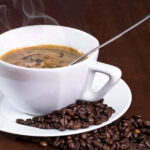
- Coffee Syrup vs Coffee Sauce (Side By Side Comparison!)
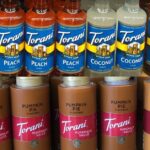
- Coffee Syrups vs Coffee Creamers (Which One To Pick?)

- 10 Popular Coffee Flavors (And How To Choose The Best!)

- Coffee Flavor Profiles (How Many Coffees Flavors Exist?)

- What Makes Cuban Coffee Different? (And Delicious!)

- Does Old Coffee Lose Caffeine?

- What Milk Froths Best? Perfect Picks For Your Coffee!

- Is Instant Coffee Real Coffee? Here’s The Truth!

- Where Do Coffee Beans Come From? Get To Know Your Coffee Cup!
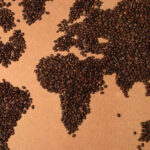

Idalmis is co-owner of Coffee Break Lovers. She is a Cuban coffee enthusiast that is passionate about coffee and coffee culture.

